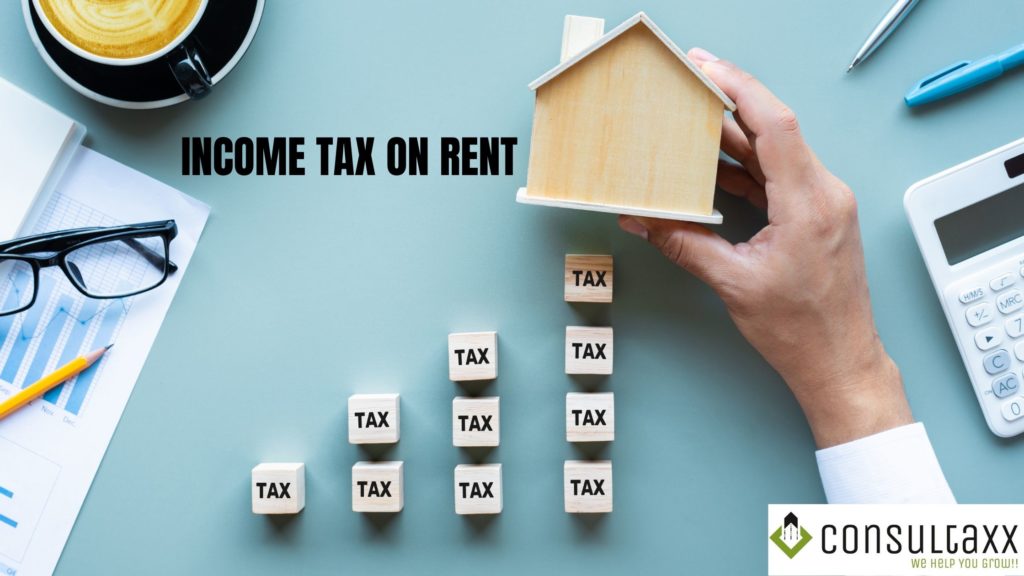
Income Tax on Rent Intro:
An individual earns income from various sources such as salary, business, rent from property, bank interest, etc. during a financial year and compute the tax liability on income. Section 14 of the Income Tax Act, states that the income of a person is taxed under 5 heads of income as follows:
• Income from salary
• Income from House property
• Income from Profits and Gains of Business/Profession
• Income from Capital Gains
• Income from Other Sources
Section 22 of the Income-tax Act is the charging section that deals with rental income taxation under the head income from house property.
2.
a. What is house property income?
The house property income means earning income by renting out your property or income on transfer of house property. As per the Income-tax Act, any properties such as houses, apartments, buildings, warehouses, etc. are considered as house property. Rental income taxation is always on the accrual basis, not on the receipt basis.
b. What is the annual rent?
Annual rent is the rent received or receivable on the property during the year. It can vary from year to year and chargeable to tax.
How to calculate annual rent?
Section 23 of the Income-tax act prescribes the computation of Annual Value (rent) of a property as below:
Net Annual Value (NAV) = Gross Annual value (-) Municipal taxes
Here, the Gross Annual Value (GAV) is the value at which property is expected (notional rent) to be let out throughout the year.
Computation of Gross Annual Value
The GAV shall be the higher of the following
• Expected rent*: The rent at which property it is expected to be let out during the year
• Rent actually received or receivable: the amount of rent actually received by the owner
Note: Rent actually received or receivable shall consider the loss due to vacancy but exclude the amount of unrealized rent.
Computation of Expected rent
|
Particulars |
Amount (Rs.) |
|
Gross annual value
|
xxx |
|
Less: Municipal
|
(xxx) |
|
Net Annual value
|
xxx |
|
Less: Deductions
|
(xxx) (xxx) |
|
Income from House property
|
(xxx) |
Expected rent shall be the higher of
• Municipal value: The valuation of the building done by the local authority of the area in which the property is situated.
• Fair rent: Fair rent shall be the value at which other similar properties are available in the same locality
However, if the property is under the control of Rent control act, then the expected rent can’t exceed standard rent. Therefore, here the expected rent shall be the maximum of standard rent.
• Standard rent: If the property is under Rent control act, then the value of the property is fixed by the act.
Computation of Income from house property
c. What deductions are available?
Section 24 of the Income-tax Act allows the following deductions while computing rental income taxation:
Payment of Municipal tax: Deduction on payment of municipal taxes by the owner (property tax) to the government.
Standard deduction (Deduction under section 24(a)): Every taxpayer is eligible to take benefit of standard deduction @ 30% of the net annual value. However, this deduction does not apply to the self-occupied house.
Interest of Home loan (Deduction under section 24(b)): Many taxpayers opt for the housing loan for purchasing, construction, or renovation. Here, they can claim the deduction of the interest component of the loan as follows:
• In the case of self-occupied property, the deduction can be claimed up to 2 lakh per annum.
• If the house property is not self-occupied, then the whole amount of loan interest (i.e., without any limit) can be availed.
3. What is composite rent and its taxation
Composite rent means when the owner or landlord of the property receives rent to provide other facilities and services such as furniture, plant, machinery, air conditioning, security, electricity, etc. in addition to the property rent. Then, the cumulative amount is known as “Composite Rent.”
Broadly, composite rent has two components
1. Renting of the property along with facilities and services (electricity, elevator, etc.)
2. Renting of the property along with other assets (Furniture, car, etc.)
The taxability of composite rental income in both cases is as below:
• Property and other services/assets can’t be separated: The rent charged for other facilities or assets are taxed under the head of other sources or profits and gains from business and professions.
• Property and other services/assets can be separated: Here, the composite rental income taxation has to be bifurcated. The rent attributed to the property is taxable under the head house property, and the rent of other services/assets will be taxed under the head of other sources or profits and gains from business and professions.
4. Applicability of GST on rent income
As per the CGST Act, renting of immovable property is treated as taxable supply of services and the implication of GST on rent is as below:
Residential property: When the property owner rents the residential property for residential purposes, it is exempt from GST. Hence, it attracts the “Nil rate” of GST. However, if the owner provides residential properties on rent for business purposes, such rental incomes are subject to GST @ 18%.
Commercial property: In case of renting of any property for commercial (business) purpose, then it attracts GST @ 18%.
It should be noted that the applicability of GST arises only when the threshold limit for GST registration exceeds.
5. NRI having house property tax
Income from a property situated in India is taxable for NRI in the same manner as for a resident. It shall be taxable under the head income from house property. Similarly, NRI is also eligible to claim the deductions under section 24:
• Municipal (Property) tax
• Standard deduction @ 30%
• Interest on loan (provided they must have NRI home loan)
6. Co-owners taxation
When two or more persons acquire a house property together, then it is called jointly owned house property, and each joint owner is known as co-owner.
Section 26 of the Income-tax Act contains the provisions dealing with the taxation of the co-owner’s shares in house property. It provides that when two or more persons own the house property and each co-owner’s share is clearly defined and ascertainable, then, each owner shall be separately liable for tax on their respective share as an individual.
However, in case the share of each co-owner is not specified, then the rental income shall be taxed in the capacity of an Association of Person (AOP).
For the taxation purpose, a house property may be self-occupied or let out:
An individual can enjoy the rental income without any tax on two self-occupied residential properties. Whereas letting out property is liable for tax on the rental income.
7. Unrealized rent and arrears of rent:
Unrealized rent is the amount of rent that is payable to the property owner by the tenant and he/she is not able to realize during a particular year.
Tax treatment of Unrealized rent and Arrears of rent
In case the owner is not able to recover rent any year or the part of the year during a financial year, he/she will not be liable to pay tax on such unrealized rent.
Further, as per section 25A of the Income Tax Act, 1961, when the tenant pays the amount of arrears of rent or the unrealized rent realized subsequently, then such amount shall be deemed to be the income under the head house property.
Such income shall be taxable in the financial year in which such rent is received or realized and also eligible for a standard deduction under section 24(a). Here, NAV shall be calculated in the same manner as provided in section 23.
However, to deduct unrealized rent from the actual rent of the previous year, four conditions should be satisfied:
• Bonafide tenancy
• Removed the defaulted tenant or taken adequate steps to make him vacant the property
• Defaulting tenant is not occupied in other property of the owner
• The Owner has taken all legal steps for recovery of rent
8. Vacant property:
If any property is lying vacant during a financial year, then such property is subject to the income tax on the basis of notional rental income.
For the purpose of taxation of vacant property, higher of the following shall be taken as GAV:
• Rent actually received or receivable
• Expected rent
Also Read : House Rent Property Calculator , Income Tax Filling, Company Registration




